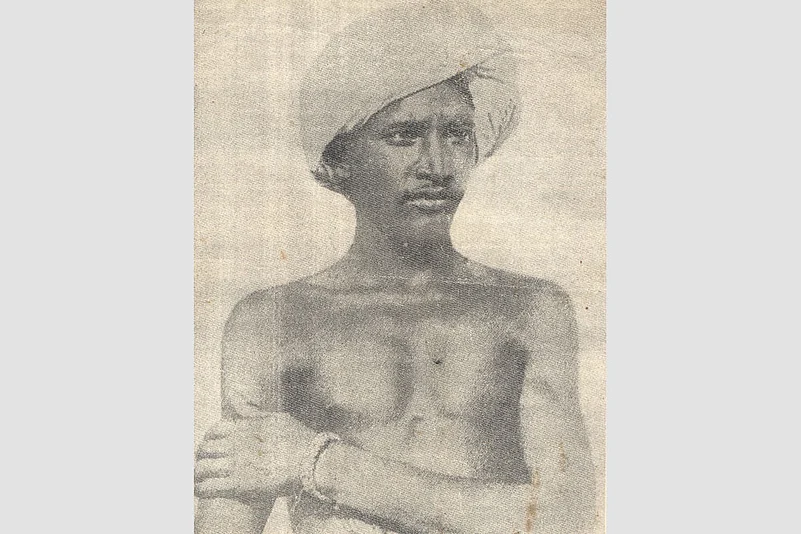Birsa Munda was an Indian freedom fighter, religious leader and folk hero from the Munda Tribe of the Chhota Nagpur Plateau area. His spirit of activism is remembered as a strong mark of protest against British rule in India. He was a spearhead behind the Millenarian movement that arose in the Bengal Presidency (Present-day Jharkhand)
Born on 15 November 1875 in Ulihatu in Bengal Presidency, now in the Khunti district of Jharkhand, he was named after that day according to the then prevalent Munda custom. He received his early education at Salga under the guidance of his teacher Jaipal Nag.
Munda spent his childhood surrounded by Christian missionaries, whose main mission was to convert as many tribal people as possible. He was advised by his teacher to enroll in the German Mission school, but to get admitted, Munda was forced to convert to Christianity. He was renamed as Birsa David and later to Birsa Daud after the conversion. Birsa left the German Mission School after studying for a few years. Between 886 to 1890, Birsa Munda spent a large amount of time in Chaibasa, in present-day Jharkhand, which was close to the centre of the Sardars. This had a strong impact on the mind of the young Birsa, who soon became a part of the anti-missionary and anti-government program.
From a Vaishnav monk, Birsa learned about Hindu religious teachings and studied ancient scriptures along with the Ramayana and Mahabharata. Birsa wanted to reform the tribal society and so, he urged them to let go of beliefs in witchcraft and instead, stressed on the importance of prayer, staying away from alcohol, having faith in God and observing a code of conduct.
Birsa Munda then founded a new religion called Birsait. The religion believed in One God and encouraged them to revert to their original religious beliefs. People started referring to him as an economical religion healer, a miracle –worker and preacher. People belonging to Oraon and Munda became convinced Birsaites, and many started referring him ‘Dharti Abba or Father of Earth’.
Through his religion, Munda also preached a strong Anti – British sentiment and mobilised thousands of tribal folk to form guerrilla armies to attack the Raj. His slogan threatening the British Raj is still remembered today in the states of Odisha, Bihar, West Bengal and Madhya Pradesh. The Slogan was ‘ Raj setar Jana, Maharani raj tundu jana’ which means ‘Let the Kingdom of the Queen be ended and our kingdom will be established’.
As his awareness of British atrocities grew, Birsa Munda also participated in anti-missionary and anti-establishment activities between 1886 – 1890 in Chaibasa, and started a movement called ‘Ulgulan’, or ‘The Great Tumult’. He was arrested by the British police on March 3, 1900, and died in Ranchi on June 9 that year. He was only 25.
Eight years after his death, the colonial government introduced the Chotanagpur Tenancy Act in 1908, which prohibits the transfer of tribal land to non-tribals.
A century after his death, Jharkhand was carved out of Bihar on his birth anniversary on November 15, 2000, and he is today fondly referred to as “Mr Jharkhand.”
The young tribal revolutionary’s life and legacy continue to be celebrated even today, particularly in the tribal regions of Bihar, Jharkhand and even parts of Karnataka and Odisha. His birth anniversary is celebrated by tribals in Mysore and Kodagu districts of Karnataka, and an official function is held annually at his Samadhi Sthal at Kokar, Ranchi, the capital of Jharkhand.
The entire state of Jharkhand has memorials named after him such as Birsa Munda Airport Ranchi, Birsa Institute of Technology Sindri, Birsa Munda Tribal University, Birsa Agricultural University, Birsa College Khunti, Birsa Munda Athletics Stadium, and even Birsa Munda Central Jail.
He is the only tribal leader whose portrait hangs in the Central Hall of Parliament. The portrait, which was unveiled by the Speaker of the Lok Sabha, Dr Balram Jakhar on 16 October 1989, was commissioned by the Birsa Munda statue committee, Rourkela.
Two Hindi movies -- Ulgulan – Ek Kranti (2004) and Gandhi Se Pehle Gandhi (2008) –were based on his life. The latter was directed by Iqbal Durrani, based on his novel with the same name.
Ramon Magsaysay Award Winner and Activist Mahasweta Devi’s historical novel, Aranyer Adhikar ( Right to the Forest, 1977) for which she won the Sahitya Akademi Award for Bengali in 1979, is based on Munda’s life and his rebellion against the British Raj in the late 19th century. The war cry of the Indian Army’s Bihar Regiment is Birsa Munda Ki Jai or Victory to Birsa Munda.
Birsa’s life was driven by poverty, but he still set a powerful example for the youth to emulate by giving more to society than what is taken. His contribution to modern India is significant, but unfortunately, he has been relegated to the background in today’s times.





















